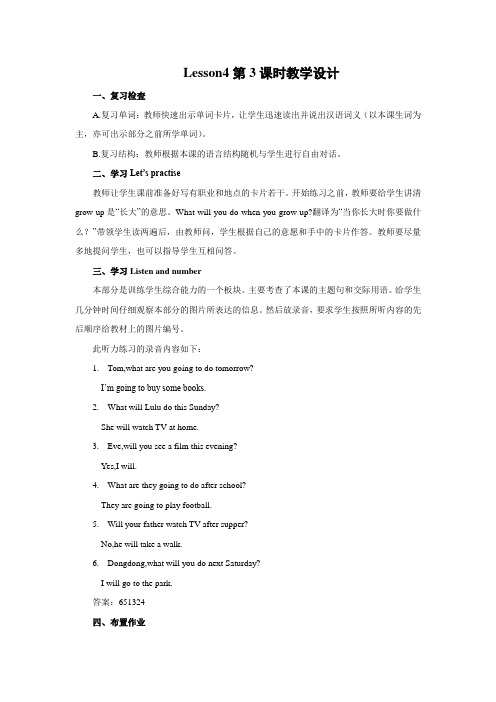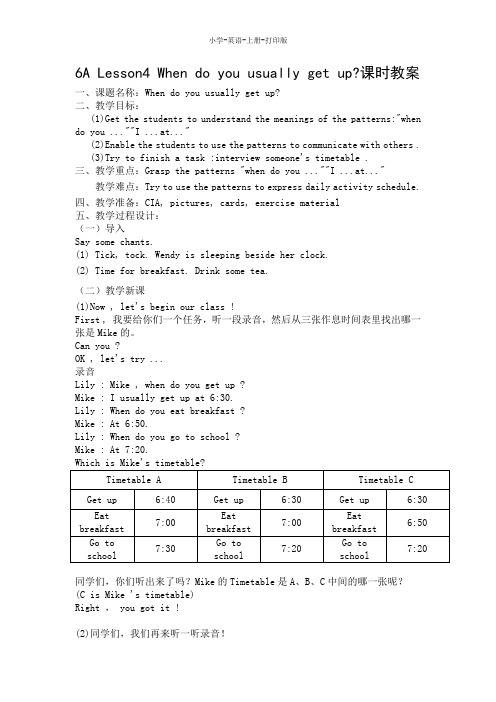科普版英语六年级上册Lesson4全课时教案(2020年最新)
- 格式:pdf
- 大小:31.29 KB
- 文档页数:5

六年级英语上册Lesson4Whatkindofbookswillyoubuy(Read《trees》)教案科普版Read 《trees》Teaching material analysic:(教材分析)Goal request:(教学重点)1.Review the words and phrases in this lesson.2.Review the grammar: The future tense.--- What will you do tomorrow ?--- I will ….--- Will you buy any books ?--- Yes ,I will.--- What will he do this Sunday?--- He will ….---What will you do when you grow up ?---I will be a nurse.Key difficulty:(教学难点)1.Let the Ss master these useful expressions :--- What will you do tomorrow ?--- I will ….--- Will you buy any books ?--- Yes ,I will.--- What will he do this Sunday?--- He will ….---What will you do when you grow up ?---I will be a nurse.2.How to use them freely and correctly.Teaching times:3(教学课时)Teaching processes:Step 1. Revision1.Review the words and expressions in this lesson. You can have a diction for them. If they have any problems ,please give them more help.2.Review the drills in this lesson:--- What will you do tomorrow ?--- I will ….--- Will you buy any books ?--- Yes ,I will.--- What will he do this Sunday?--- He will ….---What will you do when you grow up ?---I will be a nurse.Step 2 设疑自探1、Let the Ss read the text 《trees》on Page24 .Collect their problems and write them on the Bb.2、Ask them to solve them by themselves.Step3 解疑合探1、小组内讨论交流答案。

Lesson 4 What kind of books will you buy?学习内容 Let’s learn学习目标:1.能够理解并掌握一般将来时“will +动词原形”结构;2.能够掌握一般将来时的特殊疑问句和一般疑问句及其回答:教学重难点What will you do tomorrow? I will go to the bookshop. Will you buy any books? Yes, I will.教学过程:一、回顾复习:翻译下列句子,明天天气怎么样?它将是晴朗的。
What will the weather be like tomorrow?It will be sunny.明天你准备去干什么?我准备去买东西。
What are you going to do tomorrow?I’m going to do some shopping.二、学习新知:bookshop 书店 buy some books 买一些书本cinema 电影院 see a film 看电影park 公园 take some photos 拍一些照片sports centre 体育运动中心 play basketball 打篮球探究一、仿写句子:I will go to the bookshop.go to the bookshopgo to the cinemago to the parkgo to the sports centreI will.....探究二、改为一般疑问句并作肯定回答:I will buy some books.some 一些,用在陈述句中;any 一些,用在疑问句、否定句。
Will you buy any books?Yes, I will.探究三、对划线部分提问:I will go to the bookshop.What will you do?探究四、小组探究,合作完成:1.——What will you do tomorrow?——I will go to the bookshop.——Will you buy any books?——Yes, I will.2.——What will you do tomorrow?——I will go to the cinema.——Will you see a film?——Yes, I will.3.——What will you do tomorrow?——I will go to the park.——Will you take any photos?——Yes, I will.4.——What will you do tomorrow?——I will go to the sports centre.——Will you play basketball?——Yes, I will.三、巩固练习1.——Will you buy any books?——_______________________A.Yes,I do.B.Yes, I will.C.No, I will.2.He will ________ basketball this Sunday.A. playB.playsC.playing3. I will do sports tomorrow. (改为一般疑问句)_______________________________________________4. We will play football tomorrow afternoon. (对划线部分提问)_________________________________________________四、课堂小结:谈谈你的收获。

Lesson4第2课时教学设计一、复习检査A.复习单词:利用单词卡片或课件等工具复习本课词汇,重点巩固易混易错词汇。
B.复习对话:复习上一课时学的对话,先听录音,然后按上一课时布置的作业分组表演对话。
二、学习Let’s learnA.教师可通过与学生随机对话的形式导入本课Let’s learn部分。
Let’s learn及Let’s talk 的主题句都是一样的,即What will you do tomorrow?I will go to the...Will you...Yes,I will.教师可参考教学内容分析中的语言结构部分,重点讲解“will+动词原形”结构的特殊疑问句和一般疑问句的用法。
B.教师组织学生对本课主题句进行操练,可将课本上列出的地点、行为或以前学过的、本课没有列出来的相关词汇及短语,带到句型里做替换练习。
三、学习Look and say此部分是对Let’s learn部分的进一步操练。
教师可先带领学生在黑板上列出本部分要用到的动词短语:have a picnic,fly a kite,play football,play basketball等,然后教师可根据本部分图片,就相关人物进行提问。
如What will Tom do this Sunday?He will play basketball.教师也可组织学生就图片内容自行操练。
四、学习Let’s sing本课Let’s sing中的歌曲Morning comes early旋律简单,朗朗上口。
教师可先领学生学习一下歌词,歌词熟练后由教师教唱或让学生听录音学唱本课歌曲。
学会后可各小组间进行唱歌比赛。
五、布置作业做练习册中的相关练习。

What kind of books will you buy?教学目标:1、能够听、说、认读本节课的短语。
2、能理解和掌握一般将来时“will+动原”结构的特殊疑问句和一般疑问句的问答。
教学重、难点:能理解和掌握一般将来时“will+动原”结构的特殊疑问句和一般疑问句的问答。
教学方法:导学互动教学手段:多媒体、课件教学过程:一、提纲导学1、导入:今天,我们来学习第4课,板书课题,齐读课题。
出示单词,指名回答。
2、出示导纲:①熟读短语:buy some books、see a film、take some photos、playbasketball、sports centre②小组内读let’s learn对话,能够熟练地对话。
3、根据导纲提示自学导纲,将疑难问题批注在旁边。
二、合作互动4、小组内交流讨论5、展示评价:---What will you do ......?---I will ......---Will you......?---Yes ,I will.some用于肯定句,any 用于一般疑问句。
6、质疑解难:通过本节课的学习,你有什么疑问,大胆提出来。
三、导学归纳:通过本节课的学习,你有什么收获?7、生归纳8、师指导四、拓展运用9、拓展训练10、编题自练五、板书设计What kind of books will you buy?---What will you do ...?---I will ...---Will you....?---Yes ,I will.It’s on the fifth floor教学目标:1、Read and spell the new words: first, second, third, fourth, fifth, floor2、Read the important sentences:---Where is the reading room?---It’s on the fifth floor.3、培养学生的口语交际能力。

Lesson4第3课时教学设计一、复习检査A.复习单词:教师快速出示单词卡片,让学生迅速读出并说出汉语词义(以本课生词为主,亦可出示部分之前所学单词)。
B.复习结构:教师根据本课的语言结构随机与学生进行自由对话。
二、学习Let’s practise教师让学生课前准备好写有职业和地点的卡片若干。
开始练习之前,教师要给学生讲清grow up是“长大”的意思。
What will you do when you grow up?翻译为“当你长大时你要做什么?”带领学生读两遍后,由教师问,学生根据自己的意愿和手中的卡片作答。
教师要尽量多地提问学生,也可以指导学生互相问答。
三、学习Listen and number本部分是训练学生综合能力的一个板块。
主要考查了本课的主题句和交际用语。
给学生几分钟时间仔细观察本部分的图片所表达的信息。
然后放录音,要求学生按照所听内容的先后顺序给教材上的图片编号。
此听力练习的录音内容如下:1.---Tom,what are you going to do tomorrow?---I’m going to buy some books.2.---What will Lulu do this Sunday?---She will watch TV at home.3.---Eve,will you see a film this evening?---Yes,I will.4.---What are they going to do after school?---They are going to play football.5.---Will your father watch TV after supper?---No,he will take a walk.6.---Dongdong,what will you do next Saturday?---I will go to the park.答案:651324四、布置作业做练习册中的相关练习。

6A Lesson4 When do you usually get up?课时教案一、课题名称:When do you usually get up?二、教学目标:(1)Get the students to understand the meanings of the patterns:"when do you ...""I ...at..."(2)Enable the students to use the patterns to communicate with others .(3)Try to finish a task :interview someone's timetable .三、教学重点:Grasp the patterns "when do you ...""I ...at..."教学难点:Try to use the patterns to express daily activity schedule.四、教学准备:CIA, pictures, cards, exercise material五、教学过程设计:(一)导入Say some chants.(1) Tick, tock. Wendy is sleeping beside her clock.(2) Time for breakfast. Drink some tea.(二)教学新课(1)Now , let's begin our class !First , 我要给你们一个任务,听一段录音,然后从三张作息时间表里找出哪一张是Mike的。
Can you ?OK , let's try ...录音Lily : Mike , when do you get up ?Mike : I usually get up at 6:30.Lily : When do you eat breakfast ?Mike : At 6:50.Lily : When do you go to school ?Mike : At 7:20.同学们,你们听出来了吗?Mike的Timetable是A、B、C中间的哪一张呢?(C is Mike 's timetable)Right , you got it !(2)同学们,我们再来听一听录音!你们听明白了吗?Lily想知道Mike是几点起床的,她是怎么问的呢?When do you get up ?When ,什么时候?Now,please read after me!When , when ...(twice)When 相当于我俄每年以前学过的一个词组...what time .Yes !当我们想问别人什么时候起床的,该怎么问呢?Listen up !When do you get up ? (twice)同学们,当你们想知道别人什么时候吃早饭的,该怎么问呢?Eat breakfast 吃早饭When do you eat breakfast ?(3)Now , I will give you three pictures , and you look at the picture ,use the Sentence patterns "When do you ... "to ask questions ?Picture 1Doing morning exercises (When do you ...)Picture 2Have English class (When do you ...)Picture 3Play sports (When do you ...)同学们,当Lily问Mike,when do you get up?Mike 是怎么回答的呢?I usually get up at 6:00.Usually ,经常,通常。
科普版英语六年级上册:Lesson 4 When do you usually get up教案设计教学内容:本课为科普版英语六年级上册的第四课,主题为询问和表达日常作息时间。
教学内容包括学习询问和回答起床、上学、吃饭、放学、运动、做作业、睡觉等日常活动的时间。
学生将学习使用when引导的特殊疑问句,以及表达时间的相关词汇和句型。
教学目标:1. 学生能够听懂、会说、会读本课的词汇和句型,并能运用它们询问和回答日常作息时间。
2. 学生能够运用所学知识进行日常交流,提高英语口语表达能力。
教学难点:1. 学生能够正确运用when引导的特殊疑问句询问时间。
2. 学生能够熟练表达时间,如整点和半点。
3. 学生能够理解并运用课文中的日常活动词汇。
教具学具准备:1. 多媒体设备,用于播放课件和视频。
2. 课文挂图,用于展示日常活动场景。
3. 学生自备时钟模型,用于模拟表达时间。
教学过程:1. 导入:通过展示日常活动场景的图片,引导学生回顾已学的日常活动词汇,激发学生的兴趣。
2. 新课呈现:播放课件,呈现本课的主要句型和词汇。
教师引导学生跟读并模仿,确保学生正确掌握发音和用法。
3. 语言实践:学生分组进行角色扮演,模拟询问和回答日常作息时间。
教师巡回指导,纠正发音和语法错误。
5. 作业布置:布置相关的练习题,巩固所学知识。
板书设计:1. Lesson 4 When do you usually get up2. 词汇:起床、上学、吃饭、放学、运动、做作业、睡觉等日常活动词汇。
3. 句型: When do you usually get up? I usually get upat4. 时间表达:整点和半点的表达方法。
作业设计:1. 完成练习册的相关练习题。
2. 写一篇关于自己日常作息时间的小短文。
3. 与家长进行英语对话,询问和回答日常作息时间。
课后反思:本节课通过展示日常活动场景的图片,激发了学生的学习兴趣。
六年级上册英语教案 Lesson 4 What kind of books will youbuy 科普版(三起)教学内容本课为科普版(三起)六年级上册英语教材中的Lesson 4,主题为“你将购买哪种书籍”。
教学内容围绕询问书籍类型、表达个人喜好和原因展开。
学生将通过本课学习如何运用英语进行购书场景的交流。
教学目标2. 能力目标:学生能够运用所学英语知识,在实际购书场景中进行流畅的对话,并能够表达自己的喜好和选择理由。
3. 情感目标:培养学生对英语学习的兴趣,增强他们的自信心和合作意识,同时鼓励学生分享个人喜好,增进彼此了解。
教学难点1. 词汇掌握:本课涉及的书籍类型词汇较多,学生对这些词汇的准确记忆和运用是教学难点之一。
2. 句型构造:如何引导学生正确构造表达个人喜好和原因的句子,是另一个教学难点。
3. 实际应用:将所学知识应用于实际购书场景,进行真实交流,对学生的语言运用能力是一个挑战。
教具学具准备1. 多媒体课件:用于展示购书场景、词汇和句型。
2. 书籍实物或图片:用于直观展示和教授不同类型的书籍。
3. 角色扮演道具:如店员和顾客的标识牌,用于角色扮演活动。
教学过程1. 导入:通过展示不同类型的书籍图片,引导学生复习和预习相关词汇。
2. 新授:展示购书场景的多媒体课件,教授本课的重点句型和表达方式。
3. 实践:学生分组进行角色扮演,模拟购书场景,运用所学知识进行交流。
4. 巩固:通过小组竞赛等形式,巩固学生对词汇和句型的掌握。
板书设计板书将清晰展示本课的关键词汇、句型以及购书场景对话的示例。
同时,通过颜色和图示的辅助,增强学生对知识点的记忆和理解。
作业设计1. 书面作业:完成课后练习题,巩固词汇和句型。
2. 口头作业:学生分组录制购书场景的英语对话视频,至学习平台。
3. 扩展阅读:鼓励学生阅读英文书籍,并分享自己的阅读体验。
课后反思本教案以严谨的语言、清晰的逻辑结构,全面覆盖了教学内容、目标、难点、教具学具准备、教学过程、板书设计、作业设计和课后反思等八个方面,确保了教学活动的系统性和完整性。
Lesson 4 Let’s learn 参考教案教学内容(Teaching Material) Lesson 4 when do you usually get up ? ---------Let’s learn and a game设计人(Designer)教学目标(Teaching Aims) 熟练掌握日常行为词汇及熟练运用句型:What time do you usually get up ?I usually get up at ---What time does he usually go to school ? He usually goes to school at----教学重难点(Main and Difficult Point) What time do you usually get up ?I usually get up at ---What time does he usually go to school ? He usually goes to school at----教学准备(Teaching Aids) 时间卡片,奖品,冬冬起床的图片,一名学生Period First基本教学过程(参考)(Teaching Procedure)个性设计(Personality Design)Ⅰ. Revision1 review the wordsTeacher gives the phrases and students say Chinese Get up, get to school, go to school, do homework, go to bed, on weekdays, every day2 review the dialogue in the let’s talkTeacher gives the key words and asks several g roups to retell the dialogue in the let’s talk.Ⅱ.Lead inTeacher guides the students to say the dialogue A: Hello, .B: Hello, Miss/Mr…A: You are early. What time do you get up?B: I usually get up at…A: Lily is early, too. What time does she get up?B: She always gets up before six./Ⅲ、Practicea.Teachers prepared the cards with time andthings on them.Two students make a group. Students choosethe cards and practice the dialogue on thetextbook.b.Three students make a group. A students withthe cards ,other two students make a dialogue(以第三人称单数进行问答,充分练习该人称)Ⅳ.Summarya.Teachers makes a summary about thedialogue.Ⅵ.Close and homework.(学生两人一组下去练习复述,再上课时表演。
Lesson 4 What kind of books will you buy?教案【教学目标】1.知识目标:(1)能听说读写单词:difficult, healthy, bookshop, hill, country.(2)理解掌握动词词组和时间短语:cut down, take some photos, buy some books, play basketball.(3)能够听、说、认读句型以下并能对其中的动词和地点时间短语进行替换操练:--What will you do tomorrow?--I will go to the bookshop.--Will you buy any books?--Yes, I will.2.情感目标:(1)在情景创设中培养学生合作学习的能力。
(2)通过多种形式的游戏和活动,激发学生学习英语的兴趣。
(3)通过本课的学习了解学生未来的目标,并指导其树立合适的职业目标。
【教学重点】1. 掌握所学动词词组:cut down, take some photos, buy some books, play basketball.2.能在情境中替换句型中的动词词组和地点时间短语来对将来的活动进行描述,并能与他人进行交流。
【教学难点】1.能掌握本单元新单词及词组。
2.句型:--What will he do this Sunday?--He will play basketball.【教学过程】Step 1 Warming up教师课前播放歌曲Morning comes early,活跃课堂气氛,通过歌曲的教授引导学生进入新课的学习,提高其学习兴趣。
Morning comes early and bright with dew.Under your window I sing to you.Up then my comrades, up then my comrades,Let us be greeting the morn so blue.Step 2 Presentation1. Let’s talk(1)看Let’s talk部分的教学内容。